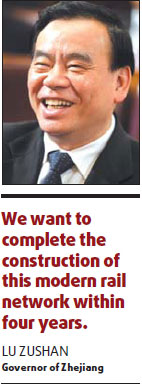|
The country's largest high-speed rail network will be built in Zhejiang by 2012, as part of the efforts to invigorate the local economy, the province's top official said on Friday.
In his government work report to the provincial people's congress, Lu Zushan, governor of Zhejiang, said: "We want to complete the construction of this modern rail network within four years."
Li Zhihai, head of the provincial development and reform commission, told China Daily that the local government will spend 130 billion yuan ($19 billion) to develop the 1,200 km network, which, on completion, will be the longest in the country and account for almost 10 percent of China's total railways.
Trains will run at upward of 200 km per hour on the new lines, he said.

The massive investment in the transport system will help promote economic development not only in Zhejiang but the whole of the Yangtze River Delta region, Li said.
The area, which is a key center for exports, has been hard hit by the global economic slowdown.
For commuters, the new high-speed rail network will mean shorter journey times between key provincial cities like Hangzhou to other major cities in the delta, such as Nanjing in Jiangsu province and Ningbo in Zhejiang province, and Shanghai.
Some intercity journey times will be cut from two hours to less than one, Li said.
As well as the new rail network, Zhejiang will spend 60 billion yuan on the expansion of its highway system. Both projects are part of an 881 billion yuan investment package designed to ensure growth this year and next, Li said.
Zhejiang's economy grew by about 10 percent last year, down from an average of more than 14 percent between 2002 and 2007, Lu said.
Exports account for 54 percent of the province's GDP, but grew 20.3 percent over the whole of last year, despite achieving 27 percent growth in the first six months, he said.
The government has set a target of 9 percent GDP growth for this year, Lu said in his report.
Ge Licheng, deputy head of the Zhejiang Academy of Social Sciences, forecast the provincial economy will grow by between 9 and 10 percent this year, but exports will achieve only 10 percent growth.
"Growth momentum hinges on whether or not the government's stimulus measures attract private sector investment," he told China Daily.
Across the country, 2 trillion yuan worth of railway construction projects are currently under way, including 80 that were launched last year, according to figures from the Ministry of Railways.
Hao Zhou and Zhang Jianming contributed to the story |


